Related Research Articles
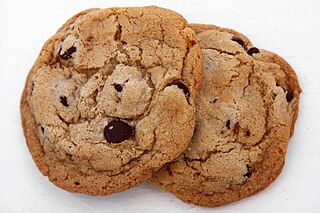
A cookie is a baked or cooked food that is typically small, flat and sweet. It usually contains flour, sugar and some type of oil or fat. It may include other ingredients such as raisins, oats, chocolate chips, nuts, etc.
Dieting is the practice of eating food in a regulated and supervised fashion to decrease, maintain, or increase body weight, or to prevent and treat diseases, such as diabetes and obesity. A restricted diet is more often pursued by those wanting to lose weight. Continuous dieting is recommended by US guidelines for obese or diabetic individuals to reduce body weight and improve general health. Some people follow a diet to gain weight. Diets can also be used to maintain a stable body weight and improve health.

Food is any substance consumed to provide nutritional support for an organism. Food is usually of plant or animal origin, and contains essential nutrients, such as carbohydrates, fats, proteins, vitamins, or minerals. The substance is ingested by an organism and assimilated by the organism's cells to provide energy, maintain life, or stimulate growth.

Junk food is unhealthful food that is high in calories from sugar or fat, with little dietary fiber, protein, vitamins, minerals, or other important forms of nutritional value.
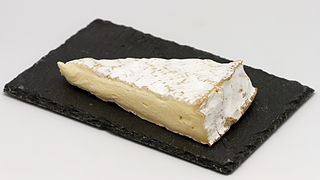
The French paradox is a catchphrase first used in the late 1980s, that summarizes the apparently paradoxical epidemiological observation that French people have a relatively low incidence of coronary heart disease (CHD), while having a diet relatively rich in saturated fats, in apparent contradiction to the widely held belief that the high consumption of such fats is a risk factor for CHD. The paradox is that if the thesis linking saturated fats to CHD is valid, the French ought to have a higher rate of CHD than comparable countries where the per capita consumption of such fats is lower.

Olestra is a fat substitute that adds no calories to products. It has been used in the preparation of otherwise high-fat foods such as potato chips, thereby lowering or eliminating their fat content. The Food and Drug Administration (FDA) originally approved olestra for use in the USA as a replacement for fats and oils in prepackaged ready-to-eat snacks in 1996, concluding that such use "meets the safety standard for food additives, reasonable certainty of no harm". In the late 1990s, olestra lost its popularity due to side effects and has been largely phased out, but products containing the ingredient can still be purchased at grocery stores in some countries.
The Zone diet is a fad diet emphasizing low-carbohydrate consumption. It was created by Barry Sears, a biochemist.
Yo-yo dieting or yo-yo effect, also known as weight cycling, is a term coined by Kelly D. Brownell at Yale University, in reference to the cyclical loss and gain of weight, resembling the up-down motion of a yo-yo. In this process, the dieter is initially successful in the pursuit of weight loss but is unsuccessful in maintaining the loss long-term and begins to gain the weight back. The dieter then seeks to lose the regained weight, and the cycle begins again.
A negative-calorie food is food that supposedly requires more food energy to be digested than the food provides. Its thermic effect or specific dynamic action—the caloric "cost" of digesting the food—would be greater than its food energy content. Despite its recurring popularity in dieting guides, there is no scientific evidence supporting the idea that any food is calorically negative. While some chilled beverages are calorically negative, the effect is minimal and requires drinking large amounts of water, which can be dangerous, as it can cause water intoxication.
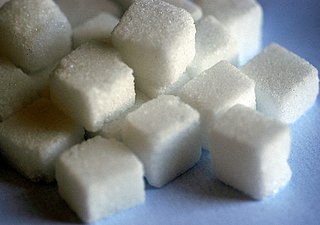
In human nutrition, the term empty calories applies to foods and beverages composed primarily or solely of sugar, fats or oils, or alcohol-containing beverages. These supply food energy but little to no other nutrition in the way of vitamins, minerals, protein, fibre, or essential fatty acids. Fat contributes nine calories per gram, ethanol seven calories, sugar four calories. The U.S. Department of Agriculture (USDA) advises, "A small amount of empty calories is okay, but most people eat far more than is healthy." The phrase is derived from low nutrient density, which is the proportion of nutrients in a food relative to its energy content.
The Montignac diet is a high-protein low-carbohydrate fad diet that was popular in the 1990s, mainly in Europe. It was invented by Frenchman Michel Montignac (1944–2010), an international executive for the pharmaceutical industry, who, like his father, was overweight in his youth. His method is aimed at people wishing to lose weight efficiently and lastingly, reduce risks of heart failure, and prevent diabetes.
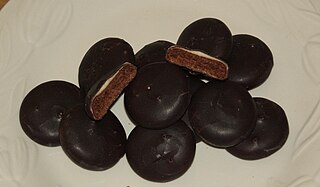
SnackWell's is a United States food brand. Introduced in 1992, its products used to include fat-free cookies of a variety of flavors including creme, shortbread, and devil's food cake. Previously a Nabisco brand, it was later sold to Back to Nature Foods.

Archway Cookies is an American cookie manufacturer, founded in 1936 in Battle Creek, Michigan. Since December 2008, it has been a subsidiary of Lance Inc., a snack-food company, who in turn merged with Snyder's of Hanover to form Snyder's-Lance. Archway is best known for its variations of oatmeal cookies.

Weight management is the phrase used to describe both the techniques and underlying physiological processes that contribute to a person's ability to attain and maintain a certain weight. Most weight management techniques encompass long-term lifestyle strategies that promote healthy eating and daily physical activity. Moreover, weight management involves developing meaningful ways to track weight over time and to identify ideal body weights for different individuals.

Sensory-specific satiety is a sensory hedonic phenomenon that refers to the declining satisfaction generated by the consumption of a certain type of food, and the consequent renewal in appetite resulting from the exposure to a new flavor or food. The phenomenon was first described in 1956 by the French physiologist Jacques Le Magnen. The term was coined in 1981 by Barbara J. Rolls and Edmund T. Rolls. Its concept illustrates the role of physical stimuli in generating appetite and, more specifically, explains the significance of taste in relation to hunger. Besides conditioned satiety and alimentary alliesthesia, it is one of the three major phenomena of satiation.
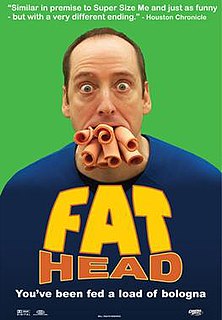
Fat Head is a 2009 American documentary film directed by and starring Tom Naughton. The film seeks to refute both the documentary Super Size Me and the lipid hypothesis, a theory of nutrition started in the early 1950s in the United States by Ancel Keys and promoted in much of the Western world.
School meal programs in the United States provide school meals free of charge, or at a government-subsidized price, to U.S. students from low-income families. These free or subsidized meals have the potential to increase household food security, which can improve children's health and expand their educational opportunities. A study of a free school meal program in the United States found that providing free meals to elementary and middle school children in areas characterized by high food insecurity led to increased school discipline among the students.

Obesity is defined as the excessive accumulation of fat and is predominantly caused when there is an energy imbalance between calorie consumption and calorie expenditure. Childhood obesity is becoming an increasing concern worldwide, and Australia alone recognizes that 1 in 4 children are either overweight or obese.
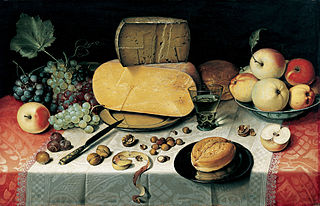
A snack is a small service of food and generally eaten between meals. Snacks come in a variety of forms including packaged snack foods and other processed foods, as well as items made from fresh ingredients at home.
References
- ↑ "One reason I've suggested is what called the SnackWell's Phenomenon: By giving a free pass to good nutrients, people go there and eat a lot more food. If one SnackWell's is okay because it's low-fat, a whole box is probably better." -- Food writer Michael Pollan in his Otis Lecture at Bates College, Oct. 27, 2008.
- ↑ http://news.consumerreports.org/home/2009/04/snackwell-effect-energy-use-consumer-reports-appliance-reviews-aceee-shelton-group-xeros-washing-mac.html
- ↑ Harris, Dena (2015). The Paleo Vegetarian Diet: A Guide For Weight Loss And Healthy Living. Berkeley, CA: Ulysses Press. p. 18. ISBN 9781612434629.
- ↑ Small, Ernest (2009). Top 100 Food Plants . Ottawa: NRC Research Press. pp. 174. ISBN 9780660198583.
- ↑ Jacobson, Michael F. (2017-03-06). "Burying the Snackwell Myth". Medium. Retrieved 2019-09-30.
- ↑ Lucas W. Davis: 'Durable Goods and Residential Demand for Energy and Water: Evidence from a Field Trial'. The RAND Journal of Economics Vol. 39, No. 2 (Summer 2008), pp. 530-546. https://www.jstor.org/stable/25474381
- ↑ "Archived copy". Archived from the original on 2010-03-26. Retrieved 2010-02-20.CS1 maint: archived copy as title (link)
- ↑ https://www.usatoday.com/money/industries/energy/2009-03-22-energysavings_N.htm
| This psychology-related article is a stub. You can help Wikipedia by expanding it. |